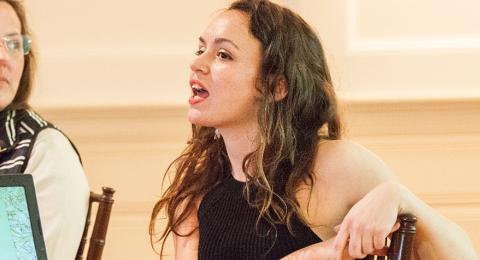UNH Land, Water and Life Acknowledgement
As we all journey on the trail of life, we wish to acknowledge the spiritual and physical connection the Pennacook, Abenaki and Wabanaki Peoples have maintained to N’dakinna (homeland) and the aki (land), nebi (water), olakwika (flora) and awaasak (fauna) that the University of New Hampshire community is honored to steward today. We also acknowledge the hardships they continue to endure after the loss of unceded homelands and champion the university’s responsibility to foster relationships and opportunities that strengthen the well-being of the Indigenous People who carry forward the traditions of their ancestors.
What is Native American and Indigenous studies?
Learn about the complex and different cultures and histories of Indigenous communities locally, nationally and globally. This interdisciplinary program draws from a range of fields, from anthropology and geography to English and history, to provide varied perspectives on issues such as colonialism, diaspora, social movements, politics and policy. You’ll learn academic theories and how they translate into practical applications. You’ll acquire skills and qualifications for graduate study and employment including work with Tribal and Indigenous leaders and officials, public health practitioners and administrators, and with institutions that require sensitivity to Indigenous issues, such as museums and other public institutions.
Why study Native American and Indigenous studies at UNH?
UNH is located on the traditional lands and waterways of the Abenaki, Pennacook and Wabanaki Peoples, past and present, who have ongoing cultural and spiritual connections to the area. UNH faculty in the Native American and Indigenous studies program are actively engaged in ongoing efforts to build an enduring relationship between the university and local Indigenous communities in New Hampshire, the United States and elsewhere in the world. Related opportunities for internships, field work and independent research are plentiful, including work with the Indigenous New Hampshire Collaborative Collective and through the many available UNH study abroad programs.
Potential career areas
- Arts
- Business
- Education
- Federal agencies and services
- Government and law
- Healthcare
- Museums
- Nonprofits and advocacy
- Sciences
Curriculum & Requirements
As an interdisciplinary minor, Native American and Indigenous studies (NAIS) offers a broad understanding of the history, lands, culture, literature, language and artistic expression, science and technology, race and identity, and social organization and political statuses of Native American and Indigenous peoples within and beyond North America. The minor provides an introduction to Indigenous values and a basis for understanding broad Indigenous issues.
NAIS complements a range of majors, including anthropology, English, history, political science, health and human services, music, psychology, biology, botany, natural resources and sustainability. The UNH Education Abroad program offers a variety of opportunities to UNH students to explore the NAIS minor overseas.
The minor will help students acquire the necessary skills and qualifications for a variety of graduate study and employment opportunities and enhance competitiveness for federal scholarships and programs, such as the Peace Corps, Teach for America or the National Parks Service. Students with NAIS training will be prepared for work with Tribal and Indigenous leaders and officials, public health practitioners and administrators, and/or working with institutions that require employees with cultural and historical sensitivity to Indigenous issues, such as museums or other public institutions. NAIS graduates may also go on to careers with organizations with Indigenous interests in the areas of education, business, arts, government and law, nonprofit and advocacy, and healthcare and science (e.g., the Native American Rights Fund, Native American Arts Council, American Indian Science and Engineering Society).
- Academic policies related to Minors.
- The minor consists of completing five courses (20 credits).
- A minimum grade of C or better is required in courses to count toward the minor.
| Code | Title | Credits |
|---|---|---|
| Requirements | ||
| NAIS 400 | Introduction to Native American and Indigenous Studies 1 | 4 |
| Select one of the following options: | 16 | |
| Option A: | ||
Select four elective courses from the approved list below | ||
| Option B: | ||
Select three elective courses from the approved list below 2 | ||
Select one independent study or credit-bearing internship (HIST 695 or ANTH 700 or other option approved by coordinator) | ||
| Total Credits | 20 | |
- 1
Also fulfills World Cultures Discovery requirement
- 2
Two courses can be from a UNH-approved education abroad program (see below).
| Code | Title | Credits |
|---|---|---|
| Approved Electives | ||
| AMST 444C | Picturing America: The Arts & Social Change | 4 |
| ANTH 412 | Broken Pots and Buried Cities: Introduction to World Archaeology | 4 |
| ANTH 500 | Peoples and Cultures of the World (A: North America and B: Latin America) | 4 |
| ANTH 501 | World Archaeological Cultures (A: North America B: Mesoamerica) | 4 |
| ANTH 513 | Ethnographic Methods | 4 |
| ANTH 514 | Method and Theory in Archaeology | 4 |
| ANTH 620 | Ritual and Religion of Ancient Mesoamerica | 4 |
| ANTH 785 | The Anthropology of Dreams and Dreaming | 4 |
| BIOL 408 | Plants and Civilization | 4 |
| ENGL 440A | Honors/On Race in Culture and Society | 4 |
| ENGL 550 | Introduction to the Literature and Culture of Race | 4 |
| HIST 405 | History of Early America | 4 |
| HIST 511 | History of New Hampshire | 4 |
| HIST 532 | Modern Latin America | 4 |
| HIST 595 | Explorations (on an approved topic) | 1-4 |
| HIST 600 | Explorations (on an approved topic) | 4 |
| HIST 603 | European Conquest of North America | 4 |
| HIST 632 | Latin American History: Topics | 4 |
| MARI 705 | Introduction to Marine Policy: Understanding US Ocean, Coastal and Great Lakes Policy | 3 |
| MUSI 515 | Music in World Cultures | 4 |
| NR 660 | Ecology and Biogeography of New Zealand | 5 |
| NR 795 | Investigations (on an approved topic) | 1-4 |
| OUT 515 | History of Outdoor Pursuits in North America | 4 |
| PSYC 581 | Child Development | 4 |
| PSYC 791W | Special Topics (on an approved topic) | 4 |
| SPAN 526 | Introduction to Latin American Cultures | 4 |
| WGS 505 | Survey in Women's Studies (on an approved topic) | 4 |
NAIS UNH-Approved Study Abroad Programs
Thailand-TEAN-Chang Mai; CIEE Khon Kaeo
USAC-Southwest Minzu University (Southwest Universities for Nationalities). Among the courses offered:
- Buddhism and Culture (ANTH/SOC)
- Tibetan Culture and Society (ANTH/SOC
- Guizhou Field Study (ANTH/WLL, 200-level, l credit)
Morocco - IES & CIEE. Courses offered:
- Gender and Society in North Africa and Beyond
- North African Cultural Identities
- Internship/Social Action Seminar
- Islam In Morocco And North Africa (English-taught)
- Arab Media and Issues of Politics and Culture
New Zealand - Otago. Courses offered:
- Maori Studies
Peru - SIT: Indigenous Peoples and Globalization. Courses offered:
- History of Indigenous Cultures in Peru
- Indigenous Peoples in Motion: Changes, Resistance, and Globalization
- Quechua
- Research Methods and Ethics
- Independent Study Project
Senegal -CIEE. Courses offered:
- Contemporary Senegalese Society and Culture
- Intercultural Communication and Leadership (English)
- Environment and Development in Senegal and Sub-Saharan Africa (English)
- Public Health Issues and Challenges in West Africa
Tanzania-CIEE. Courses offered:
- Kiswahili
- Field Research Seminar
- Pre-History, Myths, Legends, and Beliefs of East Africa
- Contemporary Educational Issues in East Africa
- Gender and Development
- History of East Africa
- Poverty Analysis for Socio-economic Development
Bhutan -API at Royal Thimphu College with internship. Courses offered:
- Anthropology of the Himalayas
- Ethnography of Bhutan
- Anthropology of Identity
- Anthropology of Gender
- Kinship and Family
- ASC201: Anthropology of Globalization
- ASC301: Anthropology of Development
- ASC303: Applied Anthropology
- ASC304: Contemporary Issues in Anthropology
- ATH101: Ecological Anthropology
- ATH102: Medical Anthropology
- ATH203: History and Theory of Anthropology
- ATH204: Political Anthropology
- ATH305: Anthropology of Religion and Rituals
Program Details
NAIS 400 is the one required course for UNH’s interdisciplinary minor in Native American and Indigenous Studies (NAIS). This course is a great opportunity to get an introduction to the interdisciplinary field of Native American and Indigenous Studies (NAIS), by exploring various Indigenous experiences and heritage. This course cultivates a broad understanding of the history, lands, culture, literature, language and artistic expression, science and technology, race and identity, and social organization and political statuses of Native American and Indigenous peoples, emphasizing Native peoples’ self-determination, sovereignty and survivance. Students will learn about significant events and issues from Indigenous perspectives and develop new ways of thinking about Native peoples.
Course units include Indigenous Identities, Indigenous Ways of Knowing, Surviving and Survivance, Tribal Justice, Museums and Media, and Indigenous New Hampshire. These units build on one another to expose students to different approaches to Native American and Indigenous studies, including readings and materials from fields of anthropology, literature, museum studies, science, law, geography, math and sustainability. The syllabus emphasizes the work of Indigenous scholars and thinkers, including Devon Mihesuah (Choctaw), Eva Marie Garroutte (Cherokee), Linda Tuhiwai Smith (Ngāti Awa and Ngāti Porou), Suzan Shown Harjo (Cheyenne and Muscogee) and Krystal Tsosie (Diné).
Assignments include Current Events presentations; a Mythbuster writing assignment that breaks down stereotypes and misconceptions; an Advocacy assignment that challenges students to address a modern issue of Tribal Justice; discussion groups of the novel "The Round House" by Louise Erdrich (Chippewa); a Critical Media Review of a recent novel, movie or museum exhibit; and a final project related to the Indigenous history and culture of New Hampshire.
We are looking forward to having you in the class!
-
ProfessorJames H. Hayes and Claire Short Hayes Professor of the HumanitiesEmail: Meghan.Howey@unh.eduPhone: (603) 862-2518
-
ProfessorProfessor of AnthropologyCore Faculty in Women's StudiesEmail: S.Peshkova@unh.edu
- Anne Jennison is a traditional storyteller with European and Abenaki heritage who holds Master's degrees in History and Storytelling. She is on the New Hampshire State Council on the Arts Traditional Artists Roster and currently serves on the NH Commission of Native American Affairs. Anne is a co-creator of the "People of the Dawnland" exhibit at Strawbery Banke Museum in Portsmouth, NH, and is a member of the Indigenous NH Collaborative Collective.
- Denise K. Pouliot is the Sag8moskwa (Female Head Speaker) of the Cowasuck Band of the Pennacook-Abenaki People and traditional artist. She currently serves on the NH Commission on Native American Affairs, is a Federal Religious Advisor, and is a founding member of the Indigenous NH Collaborative Collective. Denise is also the treasurer for COWASS North America and the Abenaki Nation of Vermont.
- Paul W. Pouliot has been the Sag8mo or Chief Speaker for the Cowasuck Band of the Pennacook-Abenaki People and president of COWASS North America and the Abenaki Nation of Vermont since 1990. Paul is an Indigenous historian, lecturer, Federal Religious Advisor, and a founding member of the Indigenous NH Collaborative Collective. He is also a founding member of the NH Commission on Native American Affairs.
The UNH Education Abroad program offers a variety of opportunities to UNH students to explore the NAIS minor overseas.
The National Student Exchange (NSE) program offers exchanges at institutions that are currently involved in cutting-edge research and teaching:
- Native Alaska Studies is available at three campuses of the University of Alaska system (Anchorage, Fairbanks and Juneau)
- Native American, First Nations or Indigenous Studies majors and courses are available at 35 NSE campuses, including Montana State University, University of Calgary, University of Minnesota Morris, University of New Mexico, University of Oklahoma and University of Ottawa.
- NSE member campuses offer courses in the following languages: Abenaki, Chickasaw, Dakota, and Lakota.









